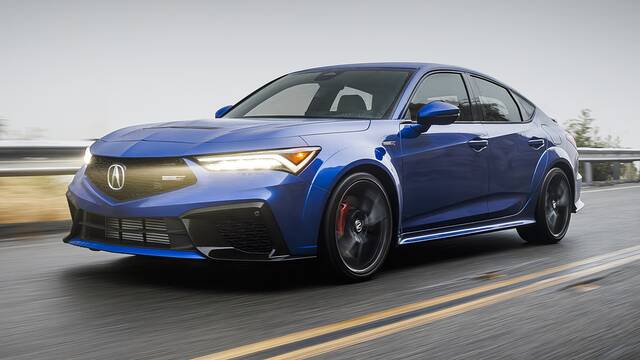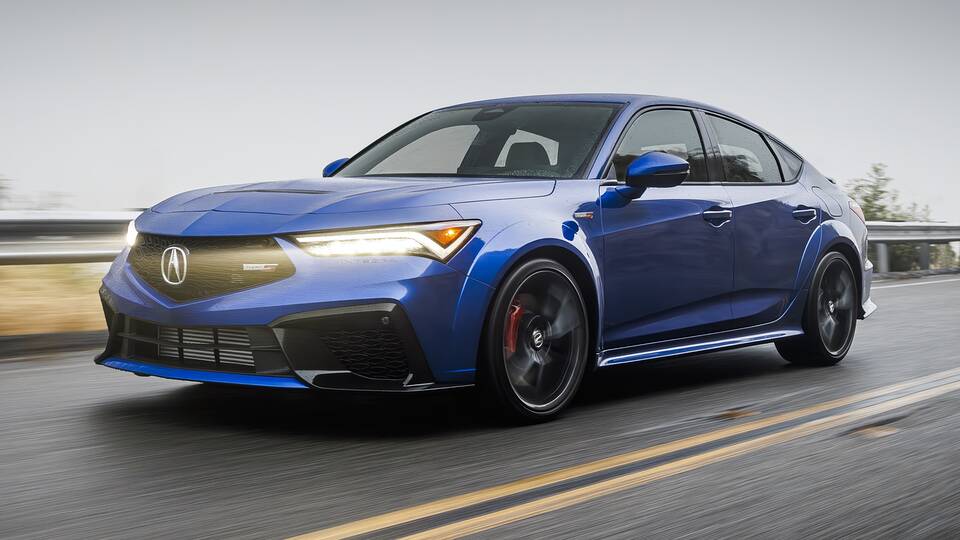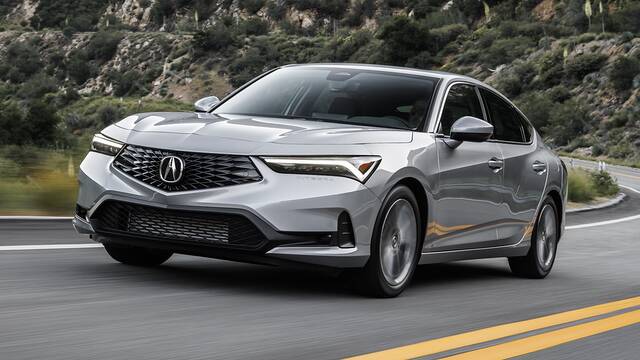FAST FACTS
2025 Acura Integra Type S
Rank
- #4 in Super Sport Compact Cars
Pros
- Big turbo punch
- Tenacious grip
- Slightly subtler styling than the Civic Type R
- Muscular presence thanks to wider tracks and flared fenders
Cons
- Manual-transmission only
- Front-wheel-drive only
- Unimpressive fuel economy
- Two-passenger rear seat reduces capacity to four
- Pricey for this level of performance
What's New for 2025?
No changes for the 2025 Integra Type S aside from an $800 price increase.
2025 Integra Selector

2025 Acura Integra Type S
Starts at $52,600
2025 Acura Integra Type S Review
by Josh Sadlier
published Sep 30, 2024 | updated Apr 18, 2025
The 2025 Integra Type S gets a hat-tip simply for being more restrained than its aggro sibling, the bewinged but otherwise nearly identical Civic Type R. If you like the Type R but would rather get less attention from the local constabulary, Acura's got what you need. But unless you're cool with intrusive road noise and mandatory front-wheel drive, you might want to take your 50 large elsewhere.
We wish Acura had at least thought to endow the Type S with all-wheel drive for all that extra coin. Why buy an Integra Type S over the cheaper and significantly faster Golf R, for example, which boasts standard AWD? We don't have a good answer for you there. But if you want to argue that the Type S is cool anyway, we'll concede that point. There are far more boring ways to spend $50k; we just think there are better ways, too, from the enthusiast driver's perspective.
|
2025 Acura Integra Type S
| |
|---|---|
| MD RATING | 8.1/10 |
| Driving Performance | 9.0 |
| Comfort & Interior | 7.0 |
| Cargo & Versatility | 8.5 |
| MPG & Range | 7.0 |
| Technology Features | 6.0 |
| Value & Warranty | 8.0 |
| X Factor | 8.5 |
Driving Performance: 9.0/10
This is the best part of the Type S experience, assuming you like to shift your own gears. A six-speed manual is the only transmission, and it's a gem, delivering buttery yet precise throws in the best Honda/Acura tradition. The boosted engine's 320 horses come on strong after a bit of lag, providing a modern-day version of "VTEC just kicked in, yo!" Grip from the performance tires is prodigious, pushing the handling limits of the Type S beyond the capabilities of most drivers. The wider track (3.5 inches wider in front, 1.9 inches out back) and bigger brakes (with four-piston Brembo front calipers) enhance stability and security.
A word about Volkswagens, though. We mentioned the Golf R above, but put that aside for now and just look at the acceleration numbers Car and Driver got for a regular old Volkswagen GTI Mk8. Yes, it had the whipsmart DSG dual-clutch automatic, not the manual (which isn't long for this world anyway), but you'll see that the 0-60 and quarter-mile performance results are in lockstep with what the same publication got for the Integra Type S. You can take your pick at the VW dealer, then: Grab the front-wheel-drive GTI and save a boatload — potentially $15k or so — compared to the Acura, or spring for the Golf R and still save a bundle. Just saying.
Comfort & Interior: 7.0/10
Even with adaptive dampers, the Type S rides firmly, but the target demographic will likely find it more than acceptable. The front sport seats are snug and supportive, although it's odd that the 12-way power-adjustable driver seat is paired with a fully manual front passenger seat. The lesser Integra A-Spec w/Technology models come standard with both the 12-way power driver seat and a power front passenger seat.
In the backseat, headroom is insufficient for taller passengers thanks to the sloping hatchback roofline, which you'll have to live with in either the Integra Type S or the Civic Type R — they're both hatchbacks. Rear legroom is generous, but there's no rear middle seat in the four-passenger Type S, so if you're a parent looking to install your kid's car seat in the safest middle position, you're out of luck. We can't figure why Acura took that middle seat away; it's not like they carved out a couple of deeply bolstered sport buckets back there. There's just no seatbelt in the middle, and you get a cupholder in the middle bottom cushion. Strange.
The biggest problem on the comfort front is road noise.
Be that as it may, the biggest problem on the comfort front is road noise. It's just a loud car when you're cruising at speed, no two ways about it. Given that it's supposed to be the more civilized of the Civic Type R/Integra Type S siblings, some additional sound-deadening material certainly would have served the Acura well.
Materials quality isn't offensive inside the Type S, but it must be noted that much of this interior comes straight out of the Civic, which starts at less than half the price. The Type S does benefit from synthetic suede seat inserts, among other trim enhancements, but your extra cash mostly goes toward the unique engine, brakes and suspension. Don't expect the interior to deliver European levels of luxury and you might be pleasantly surprised.
Cargo & Versatility: 8.5/10
You gotta hand it to the hatchback trunk in the Integra Type S. Compared to sedan alternatives, this thing is downright practical. Of course, the Civic Type R is a hatchback too, while the Golf R's breadbox-shaped cabin means it can stow a lot more stuff than the Acura. But if you need to carry some serious cargo, just flip the rear seatbacks down and the ITS is ready to haul.
Indeed, the Integra Type S is more capacious than sedans that are much larger on the outside. We think that the Type S, and by extension the regular Integra and its Civic cousins, are just about the perfect size for zipping through a city — small enough to park with ease, yet large enough to handle passengers and cargo. That holds true for the Type S despite its greater width, which comes courtesy of its wider track and flared body panels. But you do lose the rear middle seating position in the Type S, as noted, so that's something to keep in mind if versatility for you means being able to carry five passengers on occasion.
MPG & Range: 7.0/10
Considerably less fuel-efficient than the regular 1.5T Integra models, the Type S isn't really about saving gas. Can you get 30 mpg on the highway? Maybe, although the EPA says you'll top out at 28. You might think that's thrifty for a 320-horsepower car, but the all-wheel-drive BMW M235i xDrive Gran Coupe delivers 33 mpg highway alongside its 302 horsepower. Is the Bimmer an outlier? Perhaps, but consider that the 315-hp Golf R matches the Integra Type S at 28 mpg highway while also providing all-wheel drive. It's hard to avoid the conclusion that Acura's underachieving a bit on this front.
Pair that underwhelming fuel economy with the Integra's small fuel tank and you've got a recipe for stopping frequently to fill up. If you ran a full tank to empty at 28 mpg, you'd have traveled almost 350 miles, but stopping well before the 300-mile mark will be the typical routine for Type S owners. Not a huge deal, but a grand tourer this 'Teg is not.
Technology Features: 6.0/10
Honda has raised its tech game to midpack in recent times after lagging behind for many years. Still, the Integra's central touchscreen, sourced from the Civic, lacks the snazzy graphics and deep feature set of rivals from Germany in particular. It's also a bit undersized for a $50k car at 9 inches, which is a more acceptable number in the Civic's econobox class.
Overall, "adequate" is a good word for the technology you'll find in the Type S. It won't wow you with its tech, but it probably covers enough bases to keep you content. One of those bases is standard wireless Apple CarPlay and Android Auto, so that's a plus. The 16-speaker ELS sound system doesn't deliver the fantastic sound quality you might expect, but it's likely good enough if you're smitten with how the Type S drives.
Value & Warranty: 8.0/10
The Integra Type S is a front-wheel-drive hatchback that sells new for more than $50k. That's a tough proposition; the Volkswagen GTI, after all, provides nearly the same acceleration for $18k less to start. If history is any indication, though, the Type S should hold its value much better than the regular Integra, and probably also better than most rivals. So you pay a lot to get in the door, but the good news is that you should get a lot back on the other side.
On the warranty front, the Integra comes through with six years and 70,000 miles of powertrain coverage, a standout offering in a segment where 4 years/50,000 miles is the norm. Acura also throws in two years and 24,000 miles of free scheduled maintenance, which isn't a game-changer but certainly qualifies as a nice perk.
X Factor: 8.5/10
Although we have our misgivings about the Integra Type S's relatively underwhelming acceleration and its reliance on front-wheel drive, we have to give props to Acura for building this car in the first place. They could have stood pat with the Civic Type R and forced you to accept the huge wing and less refined styling overall, but instead you have two distinct flavors to choose from. Choice is good, and cars that are purely about enjoying the drive are also good. Here's to more like it.
Bottom Line
We loved the Integras of yore despite their flaws, but those models had their own distinct character relative to the Civics of their day. The powertrains and interiors were unique, for example, unlike the new Integra with its Civic-swap powertrains and dashboard. Why buy an Integra rather than any of its rivals? Resale value and a reputation for reliability, of course. But it's hard to recommend a vehicle enthusiastically on that basis.
2025 Acura Integra Type S Pricing & Specs
The 2025 Integra Type S is offered in just one mechanical configuration. Hit the link or button to read our editorial summary and see detailed specs, plus our expert analysis and recommendations.
2025 Acura Integra Type S Pricing & Specs
Scroll for more ➔
| Version | Price | Fuel | MPG | Power | Torque |
|---|---|---|---|---|---|
| 2025 Acura Integra Type S (2.0T Manual) | $52,600 | Gas | 24 | 320 hp | 310 lb-ft |

by Josh Sadlier
Publisher and Donkey-in-Chief
Josh has been reviewing cars professionally since joining Edmunds.com fresh out of grad school in 2008. Prior to founding MotorDonkey, he spent 15 years shaping Edmunds' expert automotive content in various capacities, starting as an associate editor and ultimately serving as a senior editor before wrapping up with a five-year term as the company's first-ever director of content strategy. Josh is a card-carrying member of the Motor Press Guild and a lifelong car nut who has driven, compared and critiqued thousands of cars in his career. Helping people find their perfect car never gets old—seriously!
Latest Reviews
 Let's make it official!
Let's make it official!
Be a good donkey and we'll deliver delicious car news straight to your inbox, spam-free forever.




